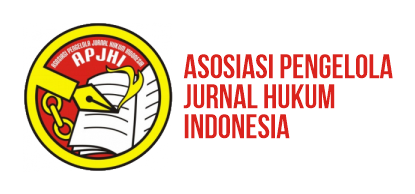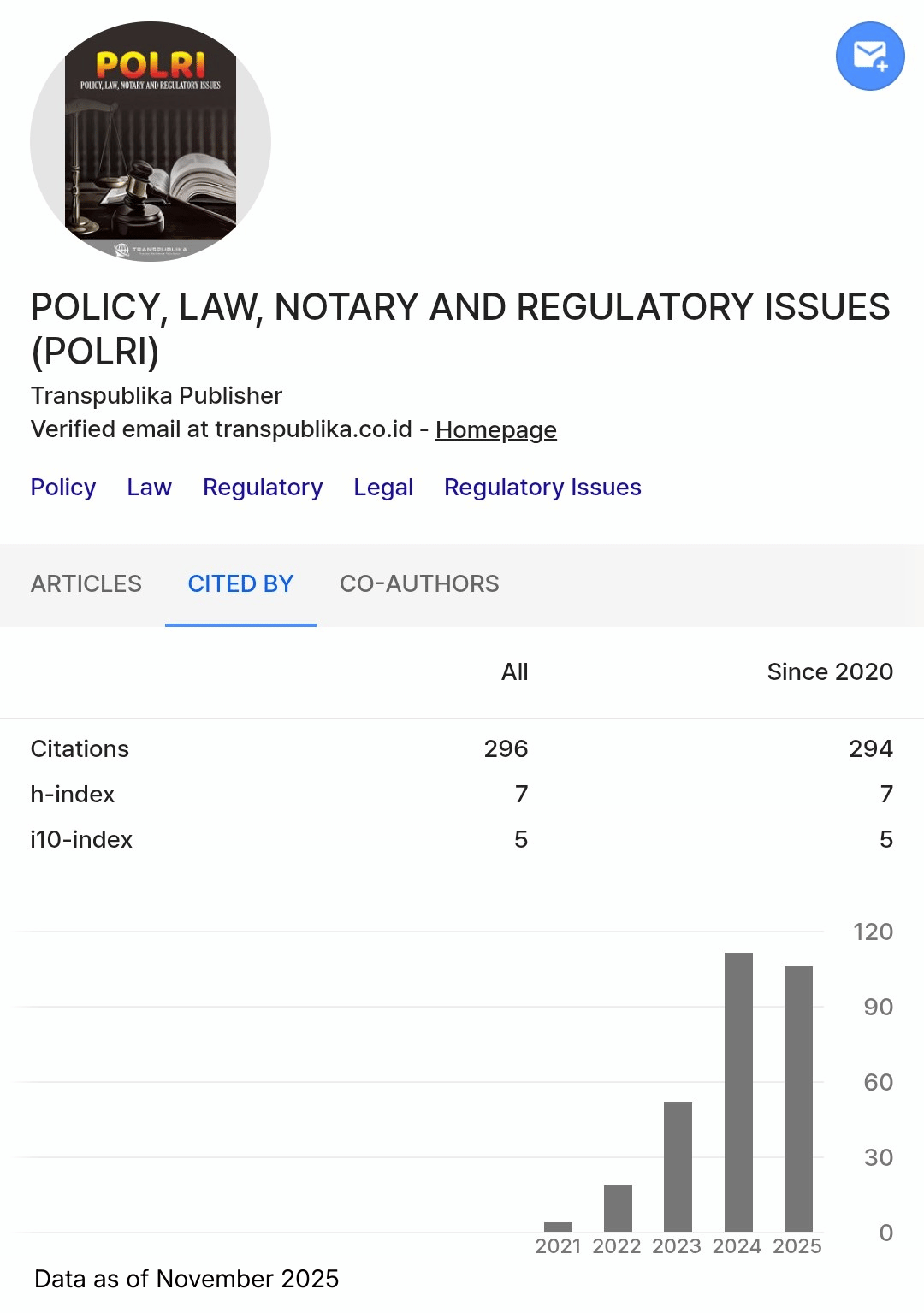The Concept of Open Legal Policy in Constitutional Court Decision No. 90/PUU-XXI/2023 on the Age Limit for Candidates for President and Vice President
Main Article Content
Sabar Indra Husni*
Hedwig Adianto Mau
Rotua Valentina Sagala
Article 6A paragraph (5) of the 1945 Constitution of Indonesia affirms the principle of open legal policy by stipulating that the procedures for the election of the President and Vice President must be regulated by law. This provides space for the legislature to regulate various provisions related to elections, while the Constitutional Court acts as an interpreter of the constitution. This study aims to analyze the application and suitability of the concept of open legal policy in the Constitutional Court Decision Number 90/PUU-XXI/2023 concerning the age limit of candidates for President and Vice President. The study employs normative legal research techniques with a qualitative juridical analysis perspective, utilizing secondary data, tertiary legal resources, and primary data for reinforcement. The theory of authority and trias politica (division of powers) is used to analyze the examined decision. The results showed that the Constitutional Court in Decision No. 90/PUU-XXI/2023 was inconsistent in deciding cases, even though the articles tested were the same and the legal considerations and rulings were similar. Therefore, it is recommended that the Constitutional Court be more consistent in issuing decisions, especially those related to open legal policies. Strengthening the capacity of Constitutional Court judges is also needed to better understand the authority and division of powers within the framework of the 1945 Constitution of the Republic of Indonesia. In conclusion, the application of the concept of open legal policy needs to be implemented consistently and wisely to maintain legal stability in Indonesia.
Ajie, R. (2016). Batasan Pilihan Kebijakan Pembentuk Undang-Undang (Open Legal Policy) Dalam Pembentukan Peraturan Perundang-Undangan Berdasarkan Tafsir Putusan Mahkamah Konstitusi. Legislasi Indonesia, 13(02).
Asshiddiqie, J. (2005). Model-model pengujian konstitusional di berbagai negara. Konstitusi Press.
Asshiddiqie, J. (2016). Konstitusi dan Konstitusionalisme Indonesia. Sekretariat Jenderal dan Kepaniteraan Mahkamah Konstitusi RI.
Buck, C. G. (2007). Judicial Activism. Encyclopedia of Activism and Social Justice, 785–789.
Busroh, A. D. (2010). Ilmu Negara. Bumi Aksara.
Canon, B. C. (1982). Defining the dimensions of judicial activism. Judicature, 66, 236.
Dimyati, K. (2018). Paradigma Rasional Dalam Ilmu Hukum: Basis Epistemologis Pure Theory of Law Hans Kelsen. Genta Publishing.
Dramanda, W. (2016). Menggagas Penerapan Judicial Restraint Di Mahkamah Konstitusi. Jurnal Konstitusi, 11(4). https://doi.org/10.31078/jk1141
Faiz, P. M. (1970). Dimensi Judicial Activism dalam Putusan Mahkamah Konstitusi. Jurnal Konstitusi, 13(2). https://doi.org/10.31078/jk1328
Falaakh, M. F. (2001). Skema Constitutional Review di Indonesia; Tinjauan Kritis. Jurnal Mimbar Hukum Nomor, 38.
Fauzani, M. A., & Rohman, F. N. (2020). Urgensi Rekonstruksi Mahkamah Konstitusi Dalam Memberikan Pertimbangan Kebijakan Hukum Terbuka (Open Legal Policy). Justitia et Pax, 35(2). https://doi.org/10.24002/jep.v35i2.2501
Hadjon, P. M. (2017). Pengkajian Penelitian Hukum Normatif. Majalah Yuridika, Surabaya, Universitas Airlangga.
Hakim, L. (2011). Kewenangan Organ Negara Dalam Penyelenggaraan Pemerintahan. Journal Konstitusi, 4(1).
Hardianto, H., Sakti, S. W. K., & Meliza, M. (2024). Masalah Batas Usia Calon Presiden Dan Calon Wakil Presiden: Studi Open Legal Policy Dalam Putusan Mk No. 90 90/Puu-Xxi/2023. Jurnal Supremasi, 15–27.
Hasan, A. (2021). Analisis Maqasid Shari’ah Terhadap Putusan Open Legal Policy Dalam Ketentuan Tindak Pidana Zina (Studi Putusan Mahkamah Konstitusi Nomor 46/Puu-Xiv/2016). IAIN Ponorogo.
Hutabarat, D. T. H., Fransisca, Z., Ritonga, F., Pardede, D. J., Almas, S., Sikumbang, N. A., Mutiara, Khoiriyah, A., Hamizah, S., Malahayati, & Suryadi. (2022). Understanding And Describing Relationship Of State Law And Human Right. Journal of Humanities, Social Sciences and Business (JHSSB), 1(1), 65–72. https://doi.org/https://doi.org/10.55047/jhssb.v1i1.63
Hutabarat, D. T. H., Salam, A., Zuwandana, A., Al Azmi, C., Wijaya, C. R., Darnita, Tania, I., Lubis, L. K. A., Sitorus, M. A. P., Adawiyah, R., & Sinaga, R. (2022). Analysis of The Implementation of Law in every level of Society in Indonesia. Policy, Law, Notary and Regulatory Issues (POLRI), 1(2), 9–14. https://doi.org/https://doi.org/10.55047/polri.v1i2.80
Indroharto. (1994). Asas-Asas Umum Pemerintahan yang Baik. In Himpunan Makalah Asas Umum Pemerintahan yang Baik. Citra Aditya Bakti.
Isra, S. (2014). Jalan Panjang Menuju Pemilu Serentak. Saldi Isra Web.
Jaya, N. S. P. (2007). Politik Hukum Badan Penyediaan. Semarang: Universitas Diponegoro.
Kmiec, K. D. (2004). The origin and current meanings of “Judicial activism.” In California Law Review (Vol. 92, Issue 5). https://doi.org/10.2307/3481421
Lailam, T. (2014). Penafsiran Konstitusi Dalam Pengujian Konstitusionalitas Undang- Undang Terhadap Undang- Undang Dasar 1945. Jurnal Media Hukum, 21(1).
Latif, A. (2009). Buku ajar hukum acara Mahkamah Konstitusi. Yogyakarta: Total Media.
Marshall, W. P. (2005). Conservatives and the Seven Sins of Judicial Activism. SSRN Electronic Journal. https://doi.org/10.2139/ssrn.330266
Mawangi, R. (2023). Keabsahan Putusan Mahkamah Konstitusi Nomor 90/PPU-XXI/2023 Terhadap Kode Etik Hakim Ditinjau dari Undang-undang Nomor 48 Tahun 2009 tentang Kekuasaan Kehakiman. MADANIA Jurnal Hukum Pidana Dan Ketatanegaraan Islam, 13(2), 108–115.
Mertokusumo, M. S., & Pitlo, A. (1993). Bab-bab tentang penemuan hukum. Citra Aditya Bakti.
Miriam, B. (1993). Dasar-dasar ilmu politik. PT Gramedia Pustaka Utama.
Mulyata, J. (2015). Kaadilan, Kepastian, dan Akibat Hukum Putusan Mahkamah Konstitusi Republik Indonesia Nomor: 100/PUU-X/2012 Tentang Judicial Review Pasal 96 Undang-Undang Nomor: 13 Tahun 2003 Tentang Ketenagakerjaan. UNS (Sebelas Maret University).
Natabaya, H. A. S., & Aziz, M. (2006). Sistem peraturan perundang-undangan Indonesia. Sekretariat Jenderal dan Kepaniteraan, Mahkamah Konstitusi.
Nggilu, N. M. (2019). Menggagas Sanksi atas Tindakan Constitution Disobedience terhadap Putusan Mahkamah Konstitusi. Jurnal Konstitusi, 16(1). https://doi.org/10.31078/jk1613
Nugroho, S. S., & Haryani, A. T. (2020). Metodologi Riset Hukum. Lakeisha, Klaten.
Piaget, J. (1972). Development and learning. Reading in Child Behavior and Development, 38–46.
Puluhulawa, F. U. (2010). Kewenangan Perizinan Dalam Pengelolaan Lingkungan Pada Usaha Pertambangan. Jurnal Legalitas, 3(2). https://doi.org/10.33756/jelta.v3i2.671
Qamar, N. (2012). Kewenangan Judicial Review Mahkamah Konstitusi. Jurnal Konstitusi, I(1).
Satriawan, I., & Lailam, T. (2019). Open Legal Policy Dalam Putusan Mahkamah Konstitusi Dan Pembentukan Undang-Undang. Jurnal Konstitusi, 16(3), 559–584.
Setiawan, H., & Wisnaeni, F. (2017). Rekonseptualisasi kewenangan Mahkamah Konstitusi dalam upaya memaksimalkan fungsi Mahkamah Konstitusi sebagai the guardian of constitution. Fakultas Hukum.
Siahaan, M. (2015). Hukum Acara Mahkamah Konstitusi Republik Indonesia. Sinar Grafika.
Simamora, J. (2013). Analisa Yuridis Terhadap Model Kewenangan Judicial Review Di Indonesia. OLD WEBSITE OF JURNAL MIMBAR HUKUM, 25(3), 388–401.
Soekanto, S., & Mamudji, S. (2013). Penelitian Hukum Normatif Suatu Tinjauan. Singkat, Jakarta: CV. Rajawali.
Soeprapto, M. F. I. (2007). Ilmu Perundang-Undangan 1: Jenis, Fungsi, dan Materi Muatan. PT Kanisius.
Subarsono, A. G. (2012). Analisis kebijakan publik: konsep, teori dan aplikasi. Pustaka Pelajar.
Sumaryono, E. (1995). Hermeneutik: sebuah metode filsafat. Penerbit Kanisius.
Weber, M. (1978). Economy and society: An outline of interpretive sociology (Vol. 1). University of California press.
Wibowo, M. (2016). Menakar Konstitusionalitas sebuah Kebijakan Hukum Terbuka dalam Pengujian Undang-Undang. Jurnal Konstitusi, 12(2). https://doi.org/10.31078/jk1221
Yulistyowati, E., Pujiastuti, E., & Mulyani, T. (2017). Penerapan Konsep Trias Politica Dalam Sistem Pemerintahan Republik Indonesia : Studi Komparatif Atas Undang Undang Dasar Tahun 1945 Sebelum dan Sesudah Amandemen. Jurnal Dinamika Sosial Budaya, 18(2), 328–338. https://doi.org/10.26623/jdsb.v18i2.580















